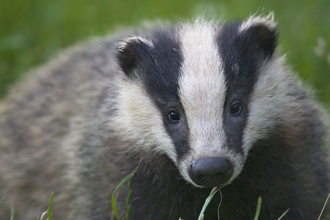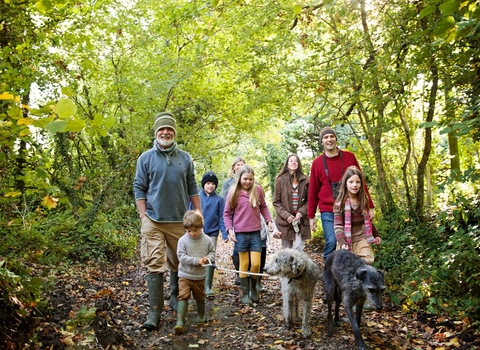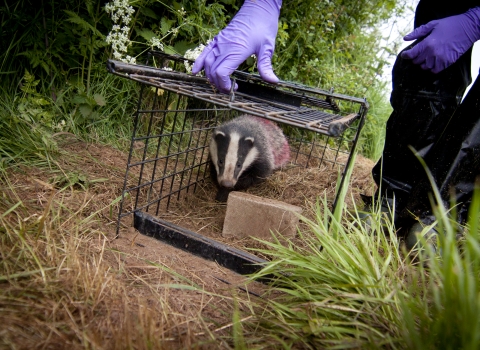
Badgers and bovine TB
Culling badgers is not the answer to the bovine TB problem
The Government promised that it would stop issuing cull licences in 2022. However, as each license runs for 4 years, the badger cull continues across many counties including Berkshire, Buckinghamshire and Oxfordshire. The area covered by culling licences increased in size in 2023 and Natural England licenced new supplementary cull zones in Oxfordshire in June 2024. The Badger Trust estimates that over 210,000 badgers have been killed since the current badger cull began in England in 2013.
BBOWT opposes culling and believes the science used to justify the killing of thousands of badgers every year in the UK is flawed. Evidence shows that bovine tuberculosis (bTB) is primarily a cattle problem, not a wildlife one. The main route of bTB transmission in cattle is between cattle. We believe an evidence-based and scientifically reliable approach must be developed to counteract the risk posed to cattle by bTB.
For more information and facts about the science behind the badger culls, visit The Wildlife Trusts' website which summarises some of the key scientific evidence on bovine TB.
BBOWT has been vaccinating badgers against bTB since 2014. You can find more information about our badger vaccination project here.
The impact on Berks, Bucks and Oxon
Licences to cull badgers are currently in place in Berkshire, Buckinghamshire and Oxfordshire and the area covered by culling licences has increased in 2023.
Read more about recent license announcements here.
Why BBOWT is against badger culling?
Having reviewed the scientific evidence available, along with other Wildlife Trusts, BBOWT strongly opposes the badger cull and will not permit culling of badgers on our land.
What is BBOWT doing?
BBOWT own and manage cattle and understand the impact that bovine TB can have on farmers. We want to find long-term effective solutions for controlling the disease.
We run a programme to trap and vaccinate badgers on our key nature reserves in Oxfordshire and over a 20km2 project area in West Berkshire.
We were the first NGO approved by Natural England and the Animal and Plant Health Agency to deliver vaccination training and each year we run training courses in badger surveying, trapping and vaccinations.
Along with other Wildlife Trusts, we continue to urge the Government to drop badger culling from its bovine TB strategy and prioritise badger vaccination, a cheaper, more effective and humane alternative, alongside a comprehensive package of cattle measures.
BBOWT is working hard to influence government decisions on dealing with badgers and bovine TB by responding to consultations on government proposals, lobbying local MPs and raising awareness of the issues to landowners and the general public.
What else needs to be done?
Badgers are not the primary cause of the spread of TB in cattle with research suggesting that 94% of cases in cattle are from other herds. It is therefore crucial that the disease is addressed in cattle and solutions to control the spread of TB should include:
- better biosecurity,
- stricter cattle movement controls,
- improved TB testing for cattle,
- development of a cattle vaccine
We can look to Wales as an example of how to deal with the problem of bovine TB. In January 2017 more than 95% of cattle herds in Wales are free from TB and this has been achieved through a programme of badger vaccinations, improved cattle tests and good farm management practices with no badgers killed.
What can you do?
Email, write to or tweet your local MP to ask them to continue to put pressure on the Government to stop the cull and instead prioritise badger vaccinations and the development of a cattle vaccine. You will find advice about lobbying your MP here.
Become a member of BBOWT - the more members we have, the more effectively we can speak up for wildlife.
Frequently asked questions
Is BBOWT going to allow a badger cull on BBOWT nature reserves?
No. Based on the scientific evidence to date, BBOWT does not support the culling of badgers and we will not permit culling to take place on nature reserves that we own and manage.
Is BBOWT vaccinating in its own area like other Wildlife Trusts?
Yes. We are currently vaccinating badgers against bovine TB on key nature reserves and surrounding land in Oxfordshire.
How can badgers transmit TB to cattle?
Tuberculosis is a highly infectious disease of the lungs. Bovine TB may be transmitted between animals through saliva, urine and faecal excretions on grass and soil. The bacterium resists desiccation and can remain viable for long periods in moist and warm soil; in cattle faeces it will survive up to 8 weeks. (Andrews, 1992).
Although TB infection has been found in badgers (Proud and Davis, 1998), it is not clear how the disease is transmitted between badgers and cattle and how commonly this occurs. A recent study found that the two species very rarely come into direct physical contact and concluded that any transmission of the disease is most likely happening through the environment (Woodruffe et al, 2017).
This raises the possibility that cattle to cattle transmission also happens through the environment and contamination of fields and yards, as well as practices such as spreading manure and slurry, could play a significant role in spreading the disease. A study is currently underway to produce heat maps tracking the disease in the farm environment which will help to improve our understanding of how bovine TB is transmitted.
Is bovine TB infectious to other animals?
Yes, bovine TB is an infectious disease of cattle. It is caused by the bacterium Mycobacterium bovis (M. bovis), which can also infect and cause TB in badgers, deer, goats, pigs, camelids (llamas and alpacas), dogs and cats, as well as many other mammals.
If The Wildlife Trusts support the killing of some species why do they oppose the cull of badgers?
Controlling non-native species can sometimes be necessary where they are proven to threaten the conservation status of native wildlife. The Wildlife Trusts only support the killing of wild animals when a strong scientific case has been made for the impacts and where it would be effective and humane. For example, as part of BBOWT's Water Vole Recovery Project, we support the trapping and humane culling of American mink at strategic sites to protect local populations of water voles.
What is the current conservation status of the badger in the UK?
Badgers are one of only a handful of large native mammals left in the UK. They are protected by national and international law and are an important part of the nation’s biodiversity.
The badger population had increased in the 1980s and 1990s following legislation to protect the species from persecution. The population is now thought to be stable at around 300,000 in the UK, although there are no up to date figures.
Importantly, the UK has 25% of the global population of the Eurasian badger, Meles meles. We therefore have an international responsibility to conserve the species, and that includes protecting the range of genetic variation within the UK population.
Is the badger population out of control because there are no natural predators?
It is true that badgers in the UK do not have any natural predators, though elsewhere in Europe cubs may be taken by mammals such as bears and wolves. The main ‘predators’ for the badger in the UK currently are road vehicles, with 50,000 badgers killed on UK roads every year.

'Obscene' badger culling licensed in Oxfordshire & Buckinghamshire
Government quietly announces 69 new cull areas over weekend.

Trust urges Government not to cull badgers it has already vaccinated
BBOWT is urging the Government to speed up its promised transition from badger culling to vaccination, and not slaughter animals that…

BBOWT 'heartbroken' by badger cull extension
Badger culling is to be extended in seven new areas of England this year, including Berkshire and Oxfordshire.
Learn more about how nature matters to everyone

Health and wellbeing
Find out moreEcosystem services
Find out more
Water vole. Picture: Tom Marshall

